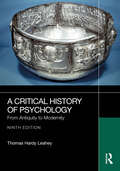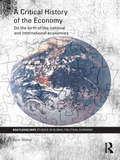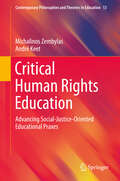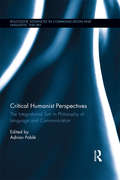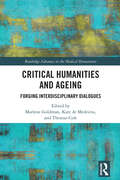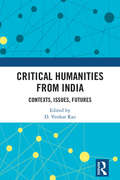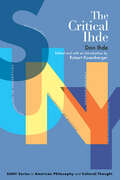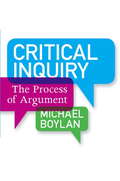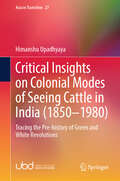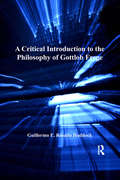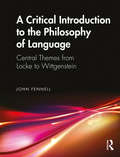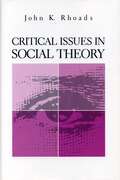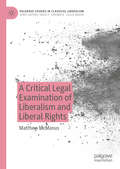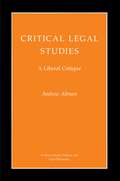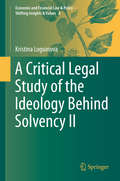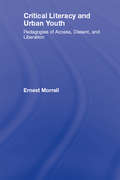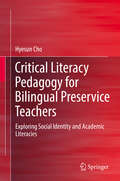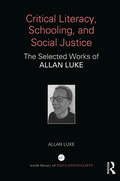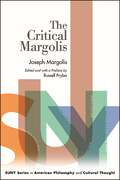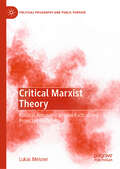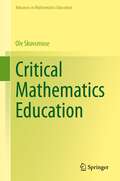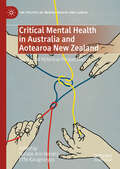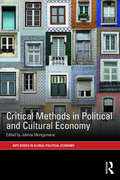- Table View
- List View
A Critical History of Psychology: From Antiquity to Modernity
by Thomas Hardy LeaheyThis fully updated and refreshed 9th edition places social, economic and political forces of change alongside psychology’s internal theoretical and empirical arguments. It utilizes a critical lens to illuminate the way in which the external world has shaped the development of psychology and, in turn, how psychology from antiquity to modernity has shaped society.The text approaches the material from an integrative, rather than wholly linear, perspective, carefully examining how issues in psychology reflect and affect concepts that lie outside the field of psychology’s technical concerns as a science and profession.Key features of this edition include: A newly reconsidered structure, including five additional interludes exploring historical background narratives and the rise of modernity, to allow for flexible and adaptable textbook use. Expanded exploration of the two psychologies: the Way of Ideas, driven by epistemology and unique to Europe, and The Way of Human Nature, a universal concern to find a science of human behavior and its management. Including scientific, applied, and professional psychology, as well as coverage of the social sciences and social policy implications, this book is appropriate for high-level undergraduate and graduate students.
A Critical History of the Economy: On the birth of the national and international economies (RIPE Series in Global Political Economy)
by Ryan WalterDrawing on recent debates in critical International Political Economy, this book mobilizes the idea that the economy does not exist separately from society and politics to develop a detailed intellectual history of how the economy came to be seen as an independent domain. In contrast to typical approaches to writing the history of economic thought, which assume the reality of the economy, the author describes the forms of intellectual argument that made it possible to conceive of the national and international economies as objects of intellectual inquiry. At the centre of this process was the analytical separation of power and wealth. Walter thus offers a broad historical perspective on the emergence of current IPE theory, while linking the field with contextualist intellectual history. This important and innovative volume will be of strong interest to students and scholars of International Political Economy, International Relations, Economics, History and Political Theory.
Critical Human Rights Education: Advancing Social-Justice-Oriented Educational Praxes (Contemporary Philosophies and Theories in Education #13)
by Michalinos Zembylas André KeetThis book engages with human rights and human rights education (HRE) in ways that offer opportunities for criticality and renewal. It takes up various ideas, from critical and decolonial theories to philosophers and intellectuals, to theorize the renewal of HRE as Critical Human Rights Education.The point of departure is that the acceptable “truths” of human rights are seldom critically examined, and productive interpretations for understanding and acting in a world that is soaked in the violations these rights try to address, cannot emerge.The book cultivates a critical view of human rights in education and beyond, and revisits receivable categories of human rights to advance social-justice-oriented educational praxes. It focuses on the ways that issues of human rights, philosophy, and education come together, and how a critical project of their entanglements creates openings for rethinking human rights education (HRE) both theoretically and in praxis.Given the persistence of issues of human rights worldwide, this book will be useful to researchers and educators across disciplines and in numerous parts of the world.
Critical Humanist Perspectives: The Integrational Turn in Philosophy of Language and Communication (Routledge Advances in Communication and Linguistic Theory)
by Adrian PabléThe present book is a collection of scholarly reflections on the theme of humanism from an integrational linguistic perspective. It studies humanist thought in relation to the philosophy of language and communication underpinning it and considers the question whether being a ‘humanist’ binds one to a particular view of language. The contributions to this volume explore whether integrational linguistics, being informed by a non-mainstream semiology and adopting a lay linguistic perspective, can provide better answers to contentious ontological and epistemological questions concerning the humanist project – questions having to do with the self, reason, authenticity, creativity, free agency, knowledge and human communication. The humanist perspectives adopted by the contributors to this volume are critical insofar as they start from semiological assumptions that challenge received notions within mainstream linguistics, such as the belief that languages are fixed-codes of some kind, that communication serves the purpose of thought transfer, and that languages are prerequisites for communication.
Critical Humanities and Ageing: Forging Interdisciplinary Dialogues (Routledge Advances in the Medical Humanities)
by Marlene Goldman Kate De Medeiros Thomas ColeProviding a critical humanities approach to ageing, this book addresses new directions in age studies: the meaning and workings of "ageism" in the twenty-first century, the vexed relationship between age and disability studies, the meanings and experiences of "queer" aging; the fascinating, yet often elided work of age activists; and, finally, the challenges posed by AI and, more generally, transhumanism in the context of caring for an ageing population. Divided into four parts: Part I: What Does It Mean to Grow Old? Part II: Aging: Old Age and Disability Part III: Aging, Old Age, and Activism Part IV: Old Age and Humanistic Approaches to Care the volume provides an innovative, two-part structure that facilitates rather than merely encourages interdisciplinary collaboration across the humanities and social sciences. Each essay is thus followed by two short critical responses from disciplinary viewpoints that diverge from that of the essay’s author. Drawing on work from across the humanities - philosophy, fine arts, religion, and literature, this book will be a useful supplemental text for courses on age studies, sociology and gerontology at both undergraduate and graduate levels.
Critical Humanities from India: Contexts, Issues, Futures
by D. Venkat RaoThe field of humanities generates a discourse that traditionally addressed the questions of what is proper to man, rights of man, crimes against humanity, human creativity and action, human reflection and performance, human utterance and artefact. The university as a philosophical-political institution transmits this humanist account. This European humanistic legacy, which is little more than Christian anthropology, barely received any questioning from cultures that faced colonialism. In such a context, this volume attempts to unravel the ‘barely secularized heritage’ of Europe (Derrida’s phrase) and its fatal consequences in other cultures. The task of Critical Humanities is to explore the ways in which the question of being human (along with non-human others) today from heterogeneous cultural ‘backgrounds’ can be undertaken. The future of the humanities teaching and research is contingent upon the risky task of configuring cultural difference from non-European locations. Such a task is inescapable and urgently needed when tectonic cultural upheavals have begun to show devastating effect on planetary coexistence today. It is precisely in such a context that this collection of essays on critical humanities affirms, ‘without alibi’, the urgency of collective reflection and innovative research across the traditional disciplinary and institutional borders and communication systems on the one hand and Asian, African and European cultural formations on the other. Critical Humanities are at one level little more than communities on the verge (critical) but whose centuries long survival and resilient creations of cultural (and /as natural) habitats are of deeply enduring significance to affirm the biocultural diversities of living that compose the planet. Topical and timely, this book will be useful to scholars, researchers and teachers of cultural theory, literary studies, philosophy, cultural geography, legal studies, sociology, history, performance studies, environmental studies, caste and communalism studies, postcolonial theory, India studies, and education.
The Critical Ihde: Suny Series In American Philosophy And Cultural Thought (SUNY series in American Philosophy and Cultural Thought)
by Don IhdeDon Ihde is one of the world's foremost thinkers on the place of technologies in our lives. Over the course of a long career, he has built a unique and useful perspective by expanding on phenomenological and American pragmatist philosophy and has developed wide-ranging insights and conceptual tools for describing the details of our experience across the various areas of human activity, including scientific practice, anthropological history, computer interface, design, art history, and the technologies of everyday life. The Critical Ihde brings together many of Ihde's most influential writings, as well as a number of under-recognized gems. Across these works are examples of his influential contributions to the phenomenology of human auditory and visual experience, his foundational work on the phenomenology of technology, and his thoughts on the technologies of scientific practice, including laboratory and medical imaging. Further, these chapters reveal the development of "postphenomenology," Ihde's original philosophical perspective, one that continues to flourish today across the work of a growing interdisciplinary and international collective of scholars.
Critical Inquiry
by Michael BoylanA succinct handbook on reading and responding critically to argumentative texts, suitable alike for courses in informal logic and the argumentative/persuasive essay. aa
Critical Inquiry
by Michael BoylanIn this revised edition of The Process of Argument (1988), Boylan (philosophy, Marymount U. , Arlington, Virginia) illustrates how to employ inductive, deductive and other reasoning tools in pro and con arguments through numerous updated examples. The concise text includes exercises on critically reading and responding to media claims (including "phishing" e-mails), appended information on micro- and macro-arguments, and a glossary. Annotation ©2009 Book News, Inc. , Portland, OR (booknews. com)
Critical Inquiry
by Michael BoylanThis informative book is a necessary companion for anyone seeking to uncover the secret of successful persuasion: to organize, construct, and communicate arguments. It is at once comprehensive and accessible, an authoritative guide to logical thinking and effective communication. First, the text defines the nature and uses of argument, explaining how to read argument carefully. Such analysis then requires the student to reconstruct arguments in his or her own words. Finally, the reader is taught how to create a critical, reasoned response, thus constructing his or her own argument. To increase its accessibility and expand its range of application, Critical Inquiry uses (in addition to textual examples) advertisements from print media as "texts" for applying its principles to subjects outside the traditional mode of academic presentation. Throughout, carefully selected reading questions and exercises pace the reader and ensure that the material is securely grasped and successfully applied.
Critical Insights on Colonial Modes of Seeing Cattle in India: Tracing the Pre-history of Green and White Revolutions (Asia in Transition #27)
by Himanshu UpadhyayaThis book traces the contours of the symbiotic relationship between crop cultivation and cattle rearing in India by reading against the grain of several official accounts from the late colonial period to the 1980s. It also skillfully unpacks the multiple cultural expressions that revolve around cattle in India and the wider subcontinent to show how this domestic animal has greatly impacted political discourses in South Asia from colonial times, into the postcolonial period. The author begins by demonstrating the dependence between the nomadic cattle breeder and the settled cultivator, at the nexus of land-livestock-agriculture, as indicated in the writings of Sir Albert Howard, who espoused some of the most sophisticated ideas on integration, holism, and mixed farming in an era when agricultural research was marked by increasing specialisation and compartmentalisation. The book springboards with the views of colonial experts who worked at imperial science institutions but passionately voiced dissenting opinions due to their emotional investment in the lives of Indian peasants, of whom Howard was a leading light. The book presents Howard and his contemporaries’ writings to then engage contemporary debates surrounding organic agriculture and climate change, tracing the path out of the treadmill of industrial agriculture and factory farming. In doing so, the book shows how, historically, animal rearing has been critically linked to livelihood strategies in the Indian subcontinent. At once a dispassionate reflection on the role played by cattle and water buffaloes in not just supporting farm operations in the agro-pastoral landscape, but also in contributing to millions of livelihoods in sustainable ways while fulfilling the animal protein in the Indian diet, the book presents contemporary lessons on development perspectives relating to sustainable and holistic agriculture. A rich and sweeping treatment of this aspect of environmental history in India that tackles the transformations prompted by the arrival of veterinary medicine, veterinary education and notions of scientific livestock management, the book is a rare read for historians, environmentalists, agriculturalists, development practitioners, and animal studies scholars with a particular interest in South Asia.
A Critical Introduction to the Philosophy of Gottlob Frege
by Guillermo E. HaddockGottlob Frege is one of the greatest logicians ever and also a philosopher of great significance. In this book Rosado Haddock offers a critical presentation of the main topics of Frege's philosophy, including, among others, his philosophy of arithmetic, his sense-referent distinction, his distinction between function and object, and his criticisms of formalism and psychologism. More than just an introduction to Frege's philosophy this book is also a highly critical and mature assessment of it as a whole in which the limitations, confusions and other weaknesses of Frege's thought are closely examined. The author is also a Husserlian scholar and this book contains valuable discussions of Husserl's neglected views and comparisons between the two great philosophers.
A Critical Introduction to the Philosophy of Language: Central Themes from Locke to Wittgenstein
by John FennellA Critical Introduction to Philosophy of Language is a historically oriented introduction to the central themes in philosophy of language. Its narrative arc covers Locke’s ‘idea’ theory, Mill’s empiricist account of math and logic, Frege and Russell’s development of modern logic and its subsequent deployment in their pioneering program of ‘logical analysis’, Ayer and Carnap’s logical positivism, Quine’s critique of logical positivism and elaboration of a naturalist-behaviorist approach to meaning, and later-Wittgenstein’s ‘ordinary language philosophy’-inspired rejection of the project of logical analysis. Thus, it historically situates the two central programs in early twentieth-century English-speaking philosophy -- logical analysis and logical positivism -- and discusses the central critiques they face later in the century in the works of Quine and the later-Wittgenstein. Unlike other secondary studies in philosophy of language, A Critical Introduction to Philosophy of Language is not just a ‘greatest hits album’, i.e., a discontinuous compilation in which classics in the field are presented together with their standard criticisms one after the other. Instead, Fennell develops a particular, historical-thematic narrative in which the figures and ideas he treats are introduced in highly intentional ways. And by cross-referencing them throughout his discussions, he highlights the contributions they make to the narrative they comprise.
Critical Issues in Social Theory (G - Reference, Information and Interdisciplinary Subjects)
by John Kenneth RhoadsCritical Issues in Social Theory is an analytical survey of persistent controversies that have shaped the field of sociology. It defines, clarifies, and proposes solutions to these "critical issues" through commentary on the writings of such influential social theorists as Hobbes, Marx, Durkheim, Weber, Mead, Merton, Parsons, and Schutz.Instead of being just another history, or another classification of theories, Rhoads's four-part model allows him to focus attention on issues that remain at the core of sociological theory today. First, Rhoads analyzes the controversy over positivism as the proper methodological model for the study of human society. Is there one science, of which sociology is a branch, or do the peculiarities of sociology's subject matter require a modification of the scientific method borrowed from the natural sciences? Rhoads next considers the relationship of individuals to society and its structures. Does society have a mode of existence distinct from its members, or is it merely an abstraction derived from the characteristics of individuals? Third, a discussion of social order raises the question of whether social order is the consequence of rules and their underlying moral values, or the product of continuous construction based on self-interest. Finally, the relative importance of consensus and conflict in social relationships is addressed. Is society better understood as a community united by beliefs, values, and rules, or is the social dynamic of continual conflict over beliefs, values, and rules more fundamental? In coming to grips with these issues, the author in some instances takes sides and in others arrives at a synthesis of diverse perspectives. In the final chapter he points to the limitations on the possibility of rational action that come to light in the clashes over these basic issues.
A Critical Legal Examination of Liberalism and Liberal Rights (Palgrave Studies in Classical Liberalism)
by Matthew McManusThis book has two aims. First, to provide a critical legal examination of the liberal state and liberal rights in the law, and secondly, to present a systematic alternative to liberal approaches to both the law and rights, grounded in a left wing conception of human dignity. At the opening of the 21st century a remarkable thing happened. Liberalism, once considered the only doctrine left standing at the end of history, began to face renewed competition from both the political left and the post-modern conservative right. This book argues that the way forward is not to abandon, but to radicalize, the potential of the liberal project. Analysing major theoretical positions in order to build a critical genealogy of liberal rights, McManus lucidly develops a left wing alternative to the classic liberal approach to rights drawing on the traditions of liberal egalitarians and deliberative democracy theory. Societies, he argues, should be committed to advancing the human dignity of all through the enshrinement of certain rights into positive state law, the expansion of democracy and a resolute commitment to economic equality.
Critical Legal Studies: A Liberal Critique (Studies in Moral, Political, and Legal Philosophy)
by Andrew AltmanScholars in the "Critical Legal Studies" movement have challenged some of the most cherished ideals of modern Western legal and political thought. CLS thinkers claim that the rule of law is a myth and that its defense by liberal thinkers is riddled with inconsistencies. This first book-length liberal reply to CLS systematically examines the philosophical underpinnings of the CLS movement and exposes the deficiencies in the major lines of CLS argument against liberalism.
A Critical Legal Study of the Ideology Behind Solvency II (Economic and Financial Law & Policy – Shifting Insights & Values #4)
by Kristina LoguinovaThis book analyzes the impact of Solvency II. In recent years, EU legislators have sought to introduce fundamental reforms. Whether these reforms were indeed fundamental is critically investigated with regard to a post-crisis piece of financial legislation affecting the EU’s largest institutional investors: Solvency II. Namely, the last financial and economic crisis, the worst financial catastrophe of the last decade, revealed that financial law in particular was not sufficiently mature to maintain the existence of a robust and trust-worthy financial system that could protect society from economic decline. The work also makes concrete recommendations on achieving a more sustainable future. As such, it offers a valuable resource for anyone who is interested in the financial system, the EU political economy, insurance, sustainability, and Critical Legal Studies.
Critical Literacy and Urban Youth: Pedagogies of Access, Dissent, and Liberation (Language, Culture, and Teaching Series)
by Ernest MorrellCritical Literacy and Urban Youth offers an interrogation of critical theory developed from the author’s work with young people in classrooms, neighborhoods, and institutions of power. Through cases, an articulated process, and a theory of literacy education and social change, Morrell extends the conversation among literacy educators about what constitutes critical literacy while also examining implications for practice in secondary and postsecondary American educational contexts. This book is distinguished by its weaving together of theory and practice. Morrell begins by arguing for a broader definition of the "critical" in critical literacy – one that encapsulates the entire Western philosophical tradition as well as several important "Othered" traditions ranging from postcolonialism to the African-American tradition. Next, he looks at four cases of critical literacy pedagogy with urban youth: teaching popular culture in a high school English classroom; conducting community-based critical research; engaging in cyber-activism; and doing critical media literacy education. Lastly, he returns to theory, first considering two areas of critical literacy pedagogy that are still relatively unexplored: the importance of critical reading and writing in constituting and reconstituting the self, and critical writing that is not just about coming to a critical understanding of the world but that plays an explicit and self-referential role in changing the world. Morrell concludes by outlining a grounded theory of critical literacy pedagogy and considering its implications for literacy research, teacher education, classroom practice, and advocacy work for social change.
Critical Literacy Pedagogy for Bilingual Preservice Teachers: Exploring Social Identity and Academic Literacies
by Hyesun ChoThis book presents a participatory action research study exploring the social identity and academic literacies of bilingual preservice teachers. It describes the transformative experiences of undergraduate students during their participation in a program specially designed to develop bilingual teachers in Hawaii, USA. Further, it discusses how the curriculum and instruction in the classroom provide a ‘third space’ for facilitating peer interaction and critical reflection on such issues as academic literacy, heritage language education, and teacher identity. In doing so, it connects ideas of social identity and academic literacies of bilingual preservice teachers to the “real work” of mentoring and teaching PreK-12 students themselves.
Critical Literacy, Schooling, and Social Justice: The Selected Works of Allan Luke
by Allan LukeIn the World Library of Educationalists series, international scholars themselves compile career-long collections of what they judge to be their finest pieces – extracts from books, key articles, salient research findings, major theoretical and/or practical contributions – so the world can read them in a single manageable volume. Readers will be able to follow the themes and strands of their work and see their contribution to the development of a field, as well as the development of the field itself. Allan Luke’s work on critical literacy, schooling, and equity has influenced the fields of literacy education, teacher education, educational sociology, and policy for over three decades. This volume brings together Allan Luke’s key writings on literacy and schooling. Chapters cover a range of topics and theories, including the development and application of a social and cultural analysis of literacy education and schooling; a primer on literacy as a social construction; classroom-based case studies of literacy teaching and learning; major theoretical and philosophic essays; practical programmatic work on school reform and enabling curriculum policies; and classroom approaches to teaching critical literacy and multiliteracies.
The Critical Margolis (SUNY series in American Philosophy and Cultural Thought)
by Joseph MargolisPragmatism's revival since 1980 can be credited to several thinkers, among them the longtime professor of philosophy at Temple University, Joseph Margolis. The Critical Margolis collects within one volume more than a dozen of his essential writings, allowing readers to become familiar with his important contributions to core areas of philosophy, where he has controversially challenged scientistic, analytic, and continental traditions. During a period when sharp divides animate intellectual debates—realism or idealism, matter or mind, causality or freedom, machines or persons, facts or values, cognition or emotion, and the like—Margolis dissolves false dichotomies and reconstructs philosophy itself. Prominent philosophers of the second half of the twentieth century, from Quine, Danto, and Putnam to Derrida, Rorty, and Brandom, along with a host of similarly significant thinkers, are targets of Margolis's critiques.If there could be a comprehensive volume of pragmatism for today and tomorrow, The Critical Margolis shall serve.
Critical Marxist Theory: Political Autonomy and the Radicalising Project of Modernity (Political Philosophy and Public Purpose)
by Lukas MeisnerThis book argues why Critical Theory – as first developed in the Zeitschrift für Sozialforschung – must be updated to help us tackling today&’s capitalist polycrisis, from economic via political to ecological crises. Yet, following the dissolution of the Institute for Social Research in New York, and the latest with the death of Adorno in 1969 and the death of Marcuse almost exactly ten years later, there has been a &‘domestication&’ of the main strands of the Frankfurt School. To understand and overcome this domestication, the book traces, with the means of philosophy and sociology, its two affirmative steps in a liberal and in a postmodern turn. As an alternative to both, it defends Habermas&’ project of modernity, yet only by disentangling it – in Marxian fashion – from the capitalist process of modernisation. This disentanglement is at the same time a political radicalisation. It is necessary because the cultural-political ideal(s) of the project of modernity – from human autonomy via rational society to qualitative individuality – can only be realised beyond the framework of capitalism. As their conceptual concentrate, the book proposes political autonomy as a key concept confined neither by Kantian or liberal approaches nor by autonomist or operaist traditions. Rather, it draws on thinkers like Herbert Marcuse, Ellen Meiksins Wood, and Martin Hägglund to rephrase Marxist concepts such as social freedom, democratic socialism, and the end of prehistory. In this way, political autonomy is developed both as a legit criterion for justified critique and as the philosophical foundation and emancipatory goal of a pluralist yet transcapitalist Critical Marxist Theory.
Critical Mathematics Education (Advances in Mathematics Education)
by Ole SkovsmoseThe book Critical Mathematics Education provides Ole Skovsmose’s recent contribution to the further development of critical mathematics education. It gives examples of learning environments, which invite students to engage in investigative processes. It discusses how mathematics can be used for identifying cases of social injustice, and it shows how mathematics itself can become investigated critically. Critical Mathematics Education addresses issues with respect to racism, oppression, erosion of democracy, sustainability, formatting power of mathematics, and banality of mathematical expertise. It explores relationships between mathematics, ethics, crises, and critique.
Critical Mental Health in Australia and Aotearoa New Zealand: Social and Historical Perspectives (The Politics of Mental Health and Illness)
by Natalie Ann Hendry Effie KarageorgosThis interdisciplinary volume examines the social production of mental health and illness in Australia and Aotearoa (New Zealand). It draws together cutting-edge critical mental health scholarship from the region, to interrogate how personal, community, institutional and mediated relations, make and remake experiences of ‘mental health.’ In the wake of the widespread insertion of psy-considerations into everyday lives, here contributors demonstrate how the relations between communities, practices, professionals and institutions often replicate long-standing histories of discrimination and violence motivated by psychiatric classification, even as the psy-disciplines move into supposedly more transformational domains: digital technology, schooling, human resources, and social media, for example. The book’s chapters reflect the current diversity within academic studies of mental health and illness in Australia and Aotearoa. This includes a wide range of case studies from war trauma in the Australian military and pornography addiction, to the depathologisation of trans health and peer workers in mental health services. Critical Mental Health in Australia and Aotearoa New Zealand offers unique insights particular to the region, to students and scholars of critical psychology, history, sociology, medical humanities, and education.
Critical Methods in Political and Cultural Economy
by Johnna MontgomerieCritical Methods in Political and Cultural Economy offers students and scholars the first methods book for the critical school of International Political Economy (IPE). What does it mean to ‘do’ critical research? How do we write about the evidence we present? This volume explores our shared critical ethic to demonstrate how methods are transformative and reimagines research strategies as both an embodied practice and a social process. By presenting methodologically informed ways of researching, enriched by real-life accounts from academics doing empirical research, the volume seeks to forge a new collaborative path that builds a critical ethic and modes of inquiry within International Political Economy. Substantive chapters advance the pluralism of the critical school of cultural political economy and seek to articulate its nascent research ethic. Short autobiographical vignettes articulate the professional journeys of contributors who ‘do’ critical political economy. There is practical advice on how to develop evidence from an iterative reflexive research strategy. Using this innovative format offers a guide to methods in critical political economy by engaging directly with the people doing research, not only as technical practice but also as lived experience. The combination of research and practice presented throughout the book offers an extensive and authoritative framework for evaluating how methods are part of critical research and will be essential reading for all students and scholars of IPE.
